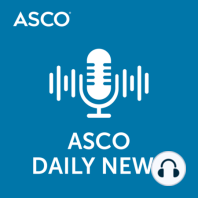10 min listen
SONIA, NATALEE, and Other Advances in Breast Cancer at ASCO23
FromASCO Daily News
ratings:
Length:
25 minutes
Released:
Jun 21, 2023
Format:
Podcast episode
Description
Drs. Allison Zibelli and Arielle Heeke discuss the NATALEE trial’s novel approach to high-risk HR+ breast cancer, the potential of delaying CDK4/6 inhibitors in HR+, HER2-negative mBC to decrease toxicities and costs in the SONIA trial, and de-escalation strategies in HER2+ early-stage breast cancer. TRANSCRIPT Dr. Allison Zibelli: Hello. I'm Dr. Allison Zibelli, your guest host for the ASCO Daily News Podcast today. I'm an associate professor of medicine and a breast medical oncologist at the Sidney Kimmel Cancer Center at Jefferson Health in Philadelphia. My guest today is Dr. Arielle Heeke, a breast medical oncologist at the Levine Cancer Institute at Atrium Health in North Carolina. Today, we'll be discussing practice-changing studies and other key advances in breast cancer that were featured at the 2023 ASCO Annual Meeting. Our full disclosures are available in the show notes and disclosures of all guests on the podcast can be found on our transcripts at asco.org/DNpod. Arielle, it's great to speak with you today. Dr. Arielle Heeke: Thank you so much for having me. Dr. Allison Zibelli: Let's start with LBA500. This was the NATALEE trial of ribociclib and endocrine therapy as adjuvant treatment in patients with hormone receptor-positive HER2-negative early breast cancer. What are your key takeaways from the study, and how do you think this changes our approach to high-risk ER-positive breast cancer? Dr. Arielle Heeke: Yeah, this was definitely the study for which many of us were waiting to see the results. It was exciting to see the results come through so quickly. As you mentioned, the NATALEE trial was a phase 3 study that evaluated three years of adjuvant ribociclib at a dose of 400 milligrams, which is a little different than what we're used to in the metastatic space at 600 milligrams. But essentially, it randomized patients to receive this 400-milligram dose with their adjuvant aromatase inhibitor therapy versus just the standard of care adjuvant endocrine therapy in patients that are high risk with early-stage breast cancer. What made NATALEE somewhat unique is they defined high risk a little bit more broadly than we've seen in previous studies, such as monarchE. So, what I mean by that is NATALEE enrolled patients with stage 2 and 3 early-stage breast cancer. And notably, they allowed for patients that were lymph node-negative but had some other high-risk features, such as a grade 3 tumor or a grade 2 tumor with high-risk genomics, such as oncotype or a high Ki-67. So, by broadening who was eligible, NATALEE captured more patients at risk for recurrence. Of course, we know that recurrence is not specific for patients with lymph node-positive disease. We can see recurrence even with stage 1, but certainly, we start to see more recurrence risk as patients drift into stage 2 and stage 3. In the NATALEE study, the majority of these patients did receive prior chemotherapy, which I also think is interesting. We've kind of seen in the metastatic space that sometimes chemotherapy can augment patients' responsiveness to CDK4/6 inhibitors. But specifically in NATALEE, 88% of patients had received prior chemotherapy, and ultimately, about a third of the patients were lymph node-negative. So, diving into some of the results with this first analysis that we saw at ASCO, with the median follow-up for invasive disease-free survival of just 27.7 months, they were able to show that the risk for invasive disease was reduced by 25.2% with the addition of ribociclib plus endocrine therapy compared to endocrine therapy alone. And this three-year invasive disease-free survival rate was 90.4% for the combination therapy compared to 87.1% for endocrine therapy alone, which is an absolute difference of 3.3%. Additionally, patients treated with ribociclib and endocrine therapy had a 26.1% reduced risk for distant disease-free survival compared with endocrine therapy alone, and this was a rate of 90.8% for
Released:
Jun 21, 2023
Format:
Podcast episode
Titles in the series (100)
#GU22: Learning From the PROpel and MAGNITUDE Trials: Dr. Neeraj Agarwal, ASCO Daily News editor-in-chief, and director of the Genitourinary Cancers Program at the University of Utah’s Huntsman Cancer Institute, shares key takeaways from the PROpel and MAGNITUDE trials in mCRPC, featured at the 2022... by ASCO Daily News
